Palmer L.R. The Greek Language
Подождите немного. Документ загружается.

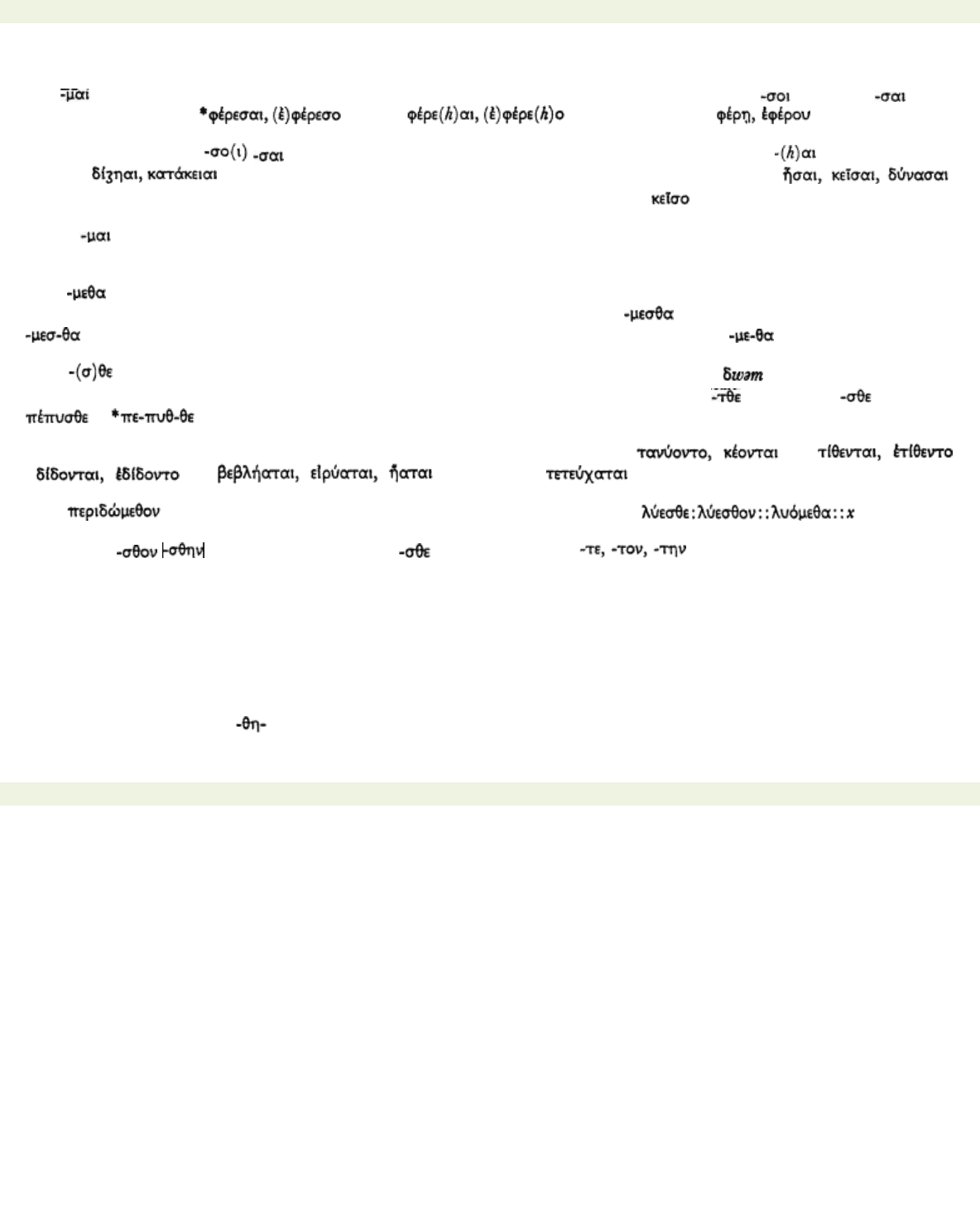
< previous page page_299 next page >
Page 299
that
was the source of the change which in all dialects except Arcado-Cypriot changed , etc., into , etc.
In the thematic verbs , etc., > , and these > Attic .
In the athematic class / was preserved after a consonant; it should develop to -(ho(i/ between vowels
(Homer , etc.), but the -s- was restored on the analogy of the consonant stems:
etc. Similarly in the secondary tenses, but in Homer the -s- is rarely restored: .
Greek corresponds to Indo-Iranian -e<*-ai, and it is conceivable that the Greek inflexion has been remodelled
under the influence of the active in -m(i).
In 4,
obviously belongs with Indo-Iranian *-madhai (Skt. -mahe, Avest. -made), and this implies IE *-medha
(or perhaps *-medha), to which the primary -i was attached. The Homeric
(cf. Hittite -wasta) analyses as
, and it is conceivable that this was a primary ending contrasting with secondary .
In 5,
is equatable with Indo-Iranian *-dhva(m) (Skt. -dhve/-dhvam, Avest. -dve/ , implying IE *-dhwe.
The -s- perhaps originated in athematic verbs ending in -s, or a dental plosive where
regularly > : e.g.
< .
In 6, Greek has reflexes of (a) *-onto(i), (b) *-nto(i) and (c) *-nto(i) * : (a) , (b)
, , (c) (< *esntai*), .
In 7, (Hom.) is a Greek innovation, the ana-logical model being .
In 8 and 9, / have been coined from on the analogy of .
III The Tenses
The formation of the present stem was discussed above.
Aorist. As stated above, the aorist is the kernel of the Greek verbal system in the sense that in this 'tense' the verbal
root, consistently with the 'undefined' function, may appear with no added formatives. The Greek system reflects
faithfully the IE distinction between root aorists and the sigmatic aorist, to which the intransitive (developing to
'passive') types in -h- and
< previous page page_299 next page >
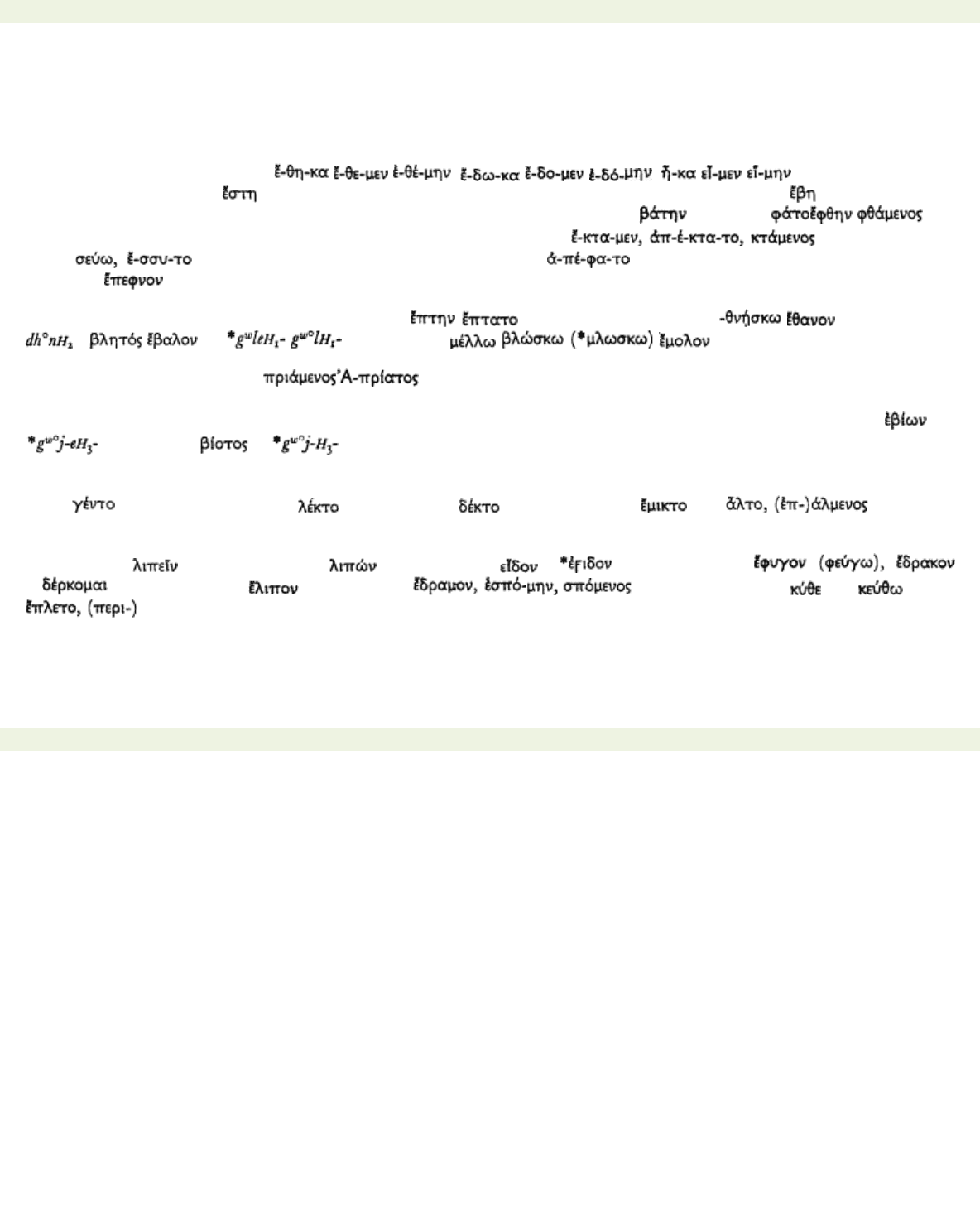
< previous page page_300 next page >
Page 300
must be added. Root aorists divide into (a) athematic and (b) thematic.
In (a) the full grade originally appeared in the singular active and the zero grade in the plural active, dual active
and everywhere in the middle voice; but the system has throughout been affected by analogical developments. The
alternation is still preserved in
/ / , / / , / / . Certain ancient
monosyllabic roots, e.g.
(Skt. ásthat<*e-sta-t, middle third singular ásthita<*e-stH2-to), (Skt. ágat<*e-
gwa *-t), have levelled the long vowel, but a few Ablaut traces remain, e.g.
(Homer), /
(Homer). The zero grade also survives in certain diphthongal roots: (< *kten-/ ktn-*
'kill'), (< *qjew-/qju- 'set in motion', 'speed'), and 'he was slain' (< *gwhen*-/gwhn-* see
below on
).
Bases with laryngeal root suffixation lie behind / ( < *pteh2-/ptH2- 'fly'), / (<*dhneH2/
), / (< / , see p. 220), / / . < *melh3-/melH3-/mlh3-
Myc. qirijato = qwriato*, cf.
has the zero grade which is reflected in Skt. kritß (on the
laryngeal and the phonology, see p. 240). An instructive contrast is provided by another root with laryngeal
extension which has the active root aorist based on the II form, that is a form of the full grade of the base:
<
cf. form III < (see p. 240 on the root gwei* 'live').
In certain roots, where the accumulation of consonants would cause difficulty, the zero grade also has the form
CeC:
' he seized' (<*gem-), 'he lay down', 'he received', cf. and .
In the thematic aorist the zero grade was regular in IE with the accent on the thematic vowel, which still persists in
the infinitive and the participle . Examples are < (cf. Skt. ávidat),
, ( cf. Skt. drsán),1 (Skt. áricat), (<*seqw* / sqw*), (cf. ),
1 The Skt. form is an athematic root aorist. It is plausibly argued that the thematic root aorist had already
developed from the athematic type in late IE.
< previous page page_300 next page >
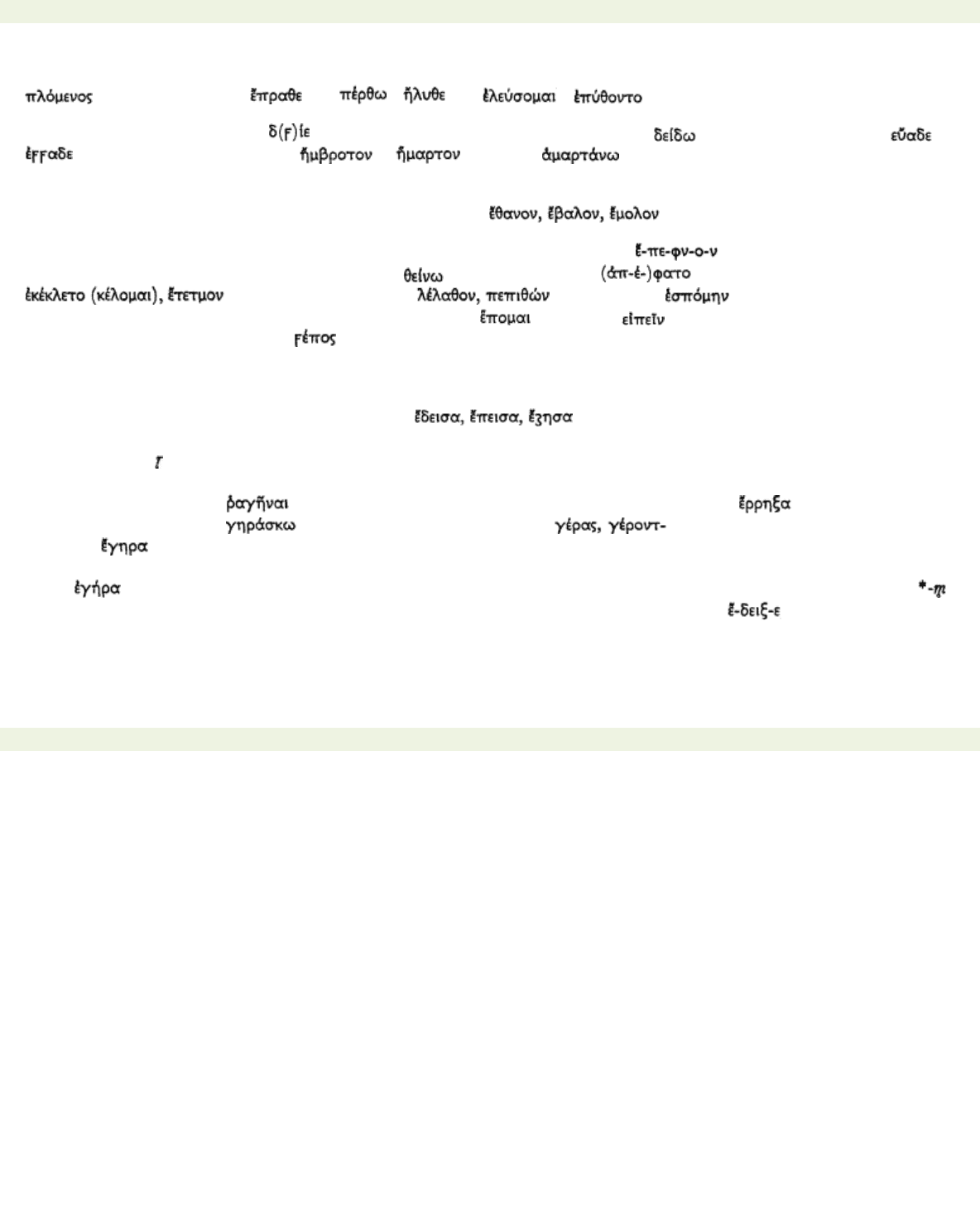
< previous page page_301 next page >
Page 301
(< *qwel- */qwl*) (cf. ), (cf. ), (Skt. bhúdhanta).
More concealed examples are 'he feared' (<*dwei-/ *dwi-, see below on ), the Homeric (Aeolic) =
( <*swad-, see p. 238) and = (aorist of , but the etymology is unknown) <
*amrt*.
On the root aorists from bases with laryngeal suffixation,
, etc., see above.
A sub-type of this class shows reduplication with zero grade of the root: in
'I slew' the constituent parts
are transparent: < *gwhen-*/*gwhn-*'slay', cf.
< *gwhen*-jo and above. Others are
(etymology unknown), , and possibly < *se-sqwo*-man,, but this
may be < *e-sqw*-o-, with aspiration on the analogy of
. The form is traced to *we-wqw* (with zero
grade of the root weqw*- seen in
), with dissimilation of the second w. For the reduplication cf. Skt. á < *a-
va-vc-a-t < *e-we-wqw*-e-t.
The most productive type of aorist (as in IE) was an athematic type formed by the suffix -s-, the sigmatic aorist,
which progressively replaced the strong aorists (
, etc.). In Sanskrit the root is lengthened
(vrddhied) in all numbers of the active, but in the middle the zero grade appears in roots of the structure CVSC,
where S=i, u or
(and more restrictedly elsewhere). In Greek Osthoff's Law would obliterate the distinction, e.g.
between *deiks- and deiks-. However, certain traces tilt the balance in fayour of the vrddhied stem also in proto-
Greek' the aorist passive
implies a root *wreg- (not *wreg-), to which the aorist was formed. Again,
the vrddhi in the present
(as against the normal grade in , Skt. járant-) has been ascribed to
an aorist
< *e-gers-m*. Such an analogical action must have taken place before the shortening of *egersa to
egersa (Osthoff's Law). An alternative explanation would find the source of the lengthening in an old athematic
aorist
. In Greek there is no trace of the Ablaut alternation in this class, and the -a of the first singular (< )
has been generalized as a kind of false thematic vowel, except in third singular, where , etc. has the same
ending as the thematic imperfect and the perfect.
The Epic language presents some sigmatic aorists with
< previous page page_301 next page >
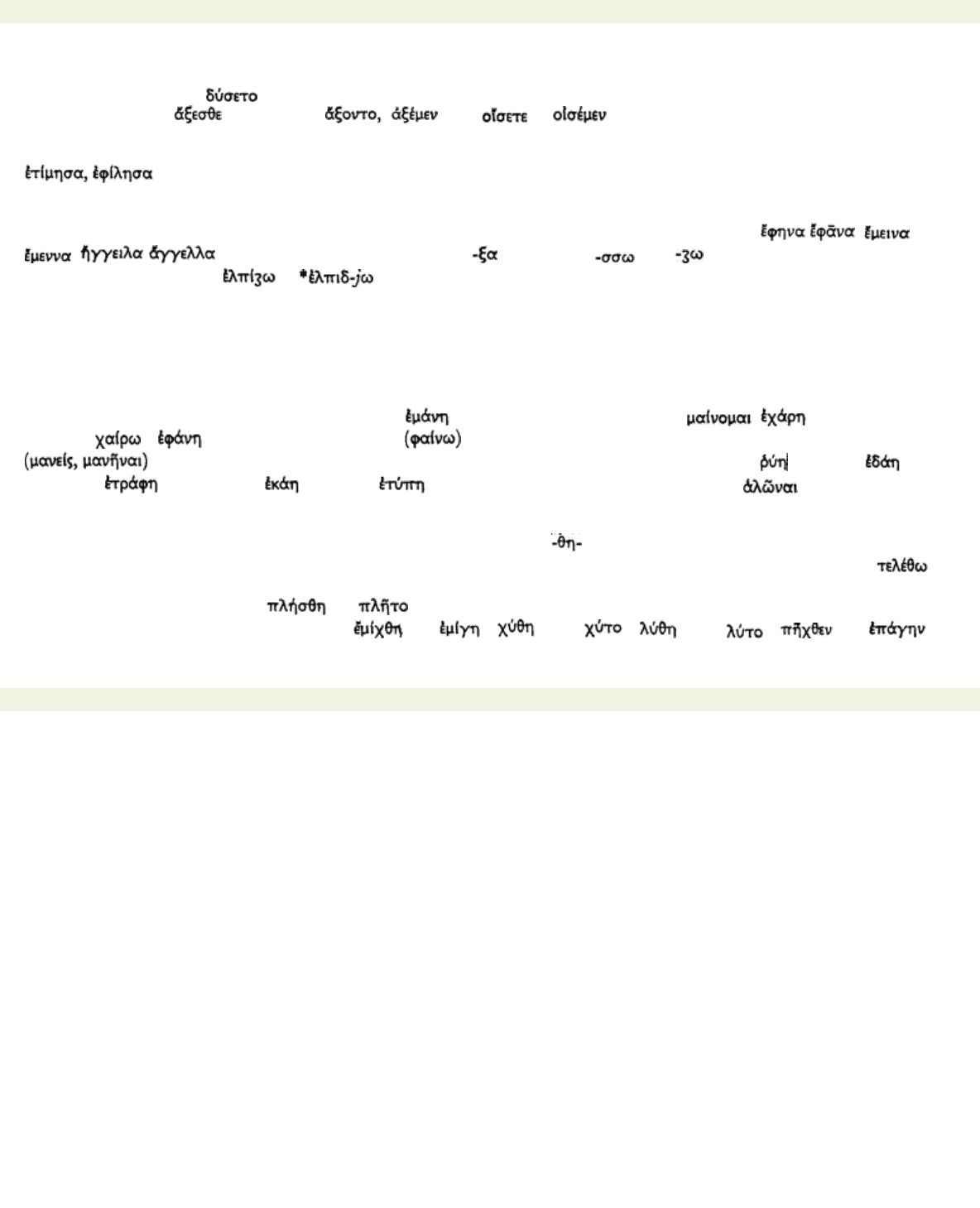
< previous page page_302 next page >
Page 302
thematic endings, e.g.
. They appear to be purely literary forms, originating perhaps in the imperatival use of
future forms; thus
gave rise to , and to .
In intervocalic positions -s- would regularly be lost, but it has been preserved (or restored) by analogy:
, etc.
The phonetic development of the sonants plus s, with disappearance of s and compensatory lengthening of the
sonant or the preceding vowel, has been discussed on pp. 236 f.: hence the dialect varieties
/ , /
, / etc. For the West Greek use of not only in and verbs from *-kj-/*-gj-, but
also in dental stems like
< , see pp. 50, 60.
Intransitive Aorists.
In the IE verb we find a class of formations with the suffix *-e-/-o- which expressed a state. Examples are Lat.
habere (Goth. haban), tacere (Goth. phahan), silere (Goth. ana-silan), iacere, latere. It is likely that such
formations originally existed only as present stems, with an athematic inflexion and ablauting suffix -e-/-H-.
Greek has incorporated the forms in the aorist:
'he flew into a rage' (present , 'he rejoiced'
(present ), 'he made an appearance' . The accent was on the suffix with zero grade of the root
, but Greek has generalized the full grade of the suffix. Other examples are: 'flowed', 'got
to know', 'was raised', 'burned', 'was struck'. The sole aorist with -o- is .
IE had no separate forms for the passive, as distinct from the middle, and in Homer the -h- formations are, in
general, intransitive. In the Epic, however, about a quarter of the
aorists are purely passive. This was a
composite suffix which was perhaps made by combining the suffix -q-, which also expressed a state (e.g.
),
with -h-. That the formation was of comparatively recent date is shown by the fact that it often takes the place of
athematic middle aorists (e.g.
for ) and that many of the examples are found only in the Odyssey and
the later parts of the Iliad. Examples are
(cf. ), (also ), (also ), (cf. ).
< previous page page_302 next page >
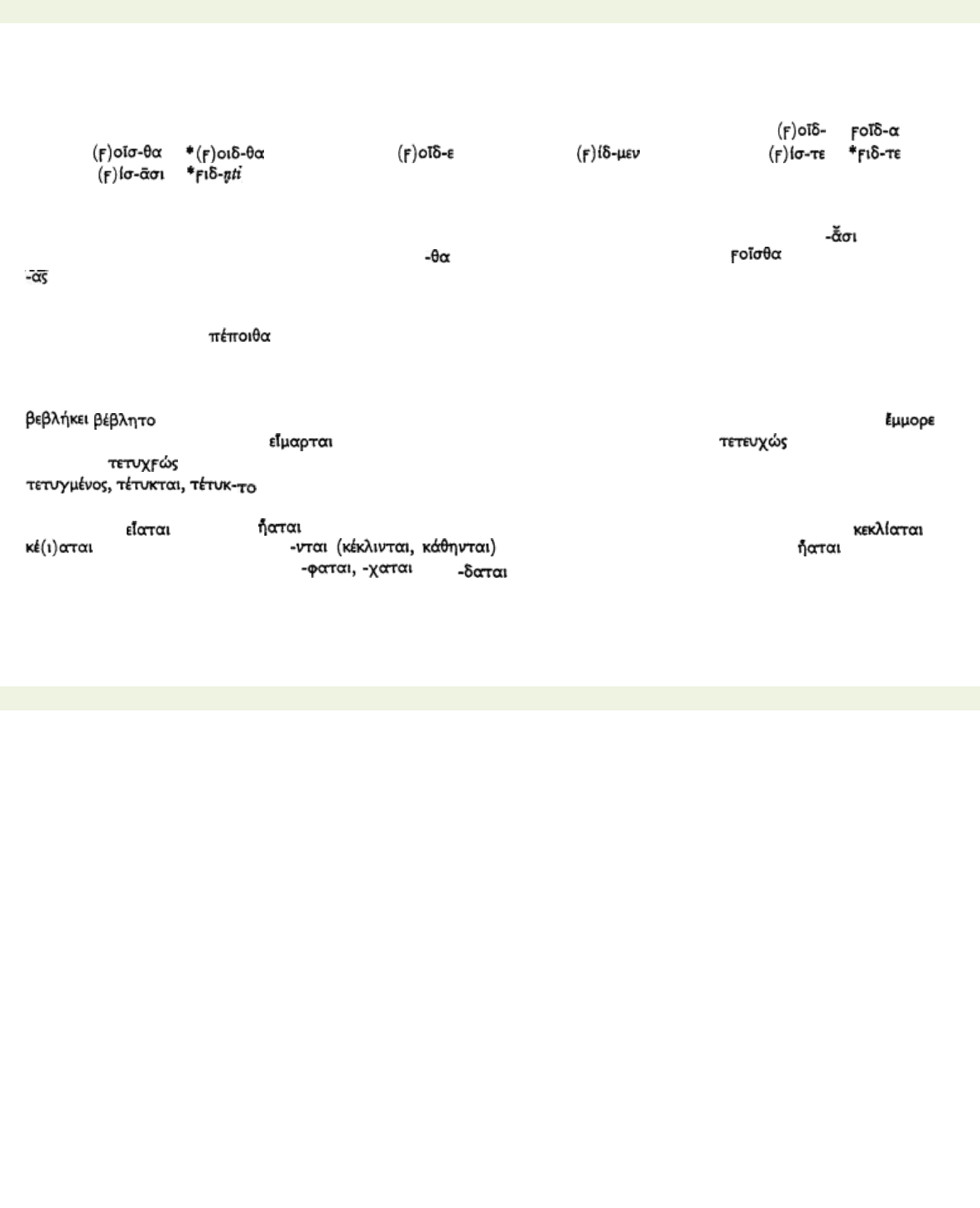
< previous page page_303 next page >
Page 303
Perfect
This IE 'tense' possessed a special set of endings which emerge clearly from the paradigm of
1, , Skt.
véda; 2, < , Skt. vét-tha; 3, , Skt. véd-a; 4, , Skt. vidmá; 5, < , Skt.
vid-á; 6,
< , Skt. vid-úr.
From this and other comparative evidence it is clear that the IE endings were 1, *-a, 2, *-tha, 3, *-e, 4, *-me. In 6,
Latin -ere<*-ero, Hittite -ir, Toch. B -are/-are show that the -r- of Skt. -ur is original and that the
of Greek
comes from the non-perfect tenses (p. 298). In 2,
is preserved in the perfect only in , the normal ending
being elsewhere introduced from the s-aorist.
Since the perfect is essentially intransitive and expresses a state of the subject, there was no occasion for a separate
set of middle endings:
means 'I believe' (as a result of persuasion). Nevertheless, since it was the function
of the middle to express a subject-bound action, it is understandable that the perfect should develop middle
inflexions, particularly with the development of the 'resultative' perfect, in which the result of the action persists in
the object. However, in Homer few verbs have both an active and a middle perfect (exceptional is the opposition
/ ), which are active/passive, but more often the active and the middle form are intransitive: is
Aeolic corresponding to Ionic
. Of particular interest is the Homeric participle 'made of', which
stands for
, as is shown by the corresponding Myc. tetukwo(h)a; elsewhere the Epic has
. We add that such middle perfects already existed in Mycenaean: epidedato =
epidedastoi.1 The perfect middle has the primary inflexions discussed above. In third plural -ntai * is used after
consonants (
stands for < *es-nati*), and it is also usual in Homer after i and i-diphthongs: ,
. Later Attic generalized whereas Ionic extended the range of < *-ntai*. In
the case of third plural endings in
(and ) and in the stems endig in -l, -n and -r Attic
substituted periphrastic forms consisting of the perfect participle middle and slat 'they
1With passive meaning 'has been assigned in addition'.
< previous page page_303 next page >
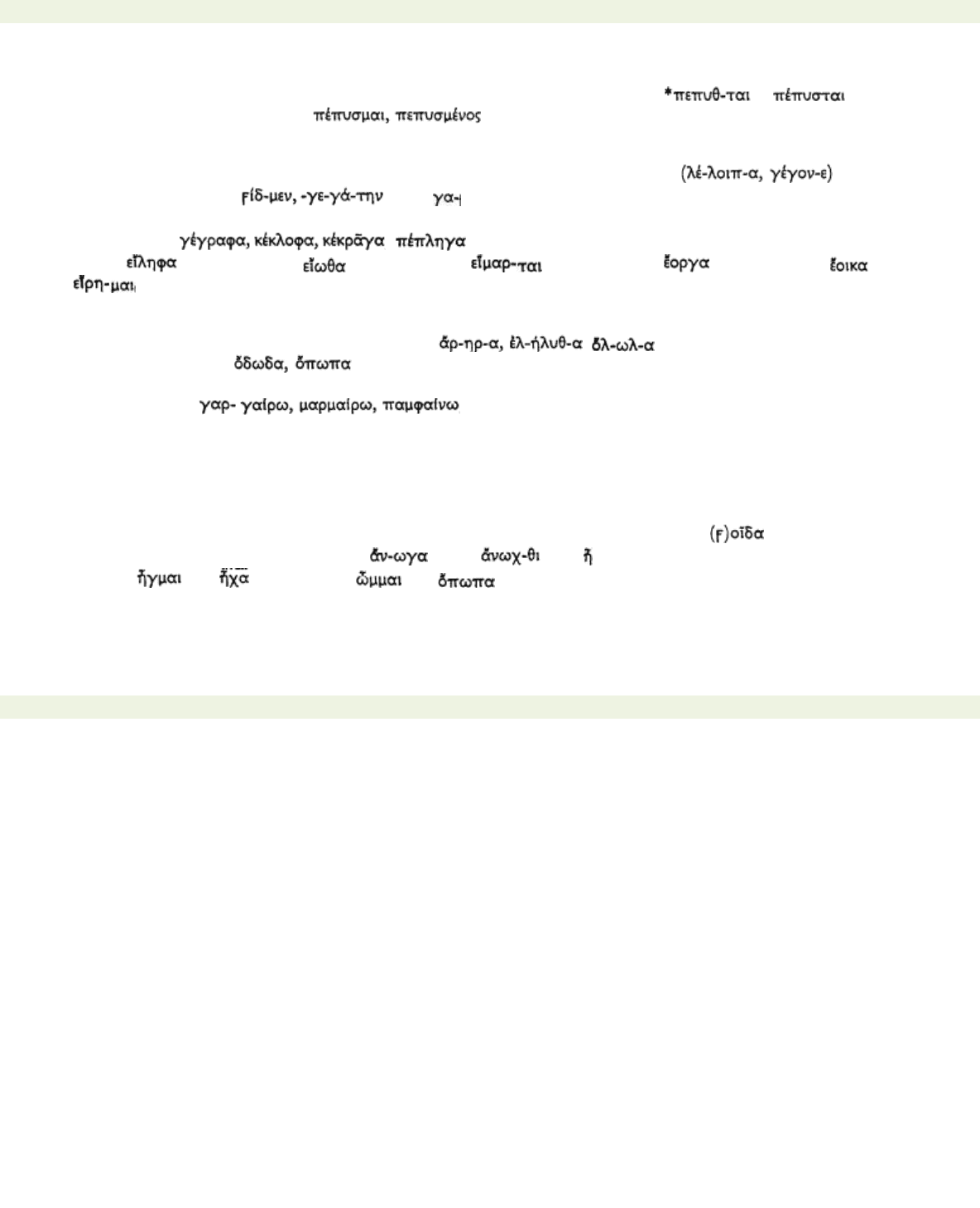
< previous page page_304 next page >
Page 304
are'. Stems ending in a dental changed this consonant regularly (p. 241) to -s- (
> ) and - s-was
thence extended to the other forms:
, etc.
The perfect is an athematic type, i.e. the endings were added directly to the stem. The stem is formed 1, by
reduplication (in the vast majority of examples) and 2, with o-grade of the ablaut in the singular
and zero grade elsewhere (
, with < *gn *). In the reduplication the vowel is invariably e and
the preceding consonant is the initial consonant of the root or the first consonant if the root begins with a cluster of
plosive and liquid:
, . Certain sound developments have obscured the re-
duplication:
< *se--slabh-, < *se-swodh-, > < *se-smr*; < *we-worg-, < *we-
woik,
< *we-wre- (p. 227).
A different form of reduplication appears with roots of the structure VS, where S = l, m, n, r: the first syllable is
repeated with lengthening of the vowel of the root'
, . This type spread to other roots with
vocalic first element (e.g.
, etc.), and it is particularly frequent in Attic; hence the term 'Attic
reduplication'. The origin of this reduplication is disputed. In essence it resembles the intensive reduplication of the
whole initial syllable
, etc.). If reduplication was felt to be a necessary feature of
the perfect, then in the absence of an initial consonant the intensive type was the obvious alternative. This,
however, leaves the lengthening of the root vowel unexplained. Some scholars trace this to IE lengthened perfects
like Lat. edi, odi, a formation resembling that of Sanskrit roots beginning with a, which have a (< a + a) in the
perfect, e.g. ada < ad- 'eat', asa < as- 'be'. These have been traced to forms reduplicated with an initial laryngeal
consonant: *H1e-H1d- > *ed-, *H3eH3d- > od-. This construction assumes, of course, generalization of the zero
grade from the plural and dual to the active, and it does not explain egi, etc. Besides
, Greek offers a few
examples of perfect without reduplication: (imp. ), cf. 'he said'<*eg-/og- (with *Hg- in Lat. aio
from *Hgjo), (on , see below), (cf. ).
It remains to explain how such a long-vowel perfect came to be recharacterized by the reduplication. It has been
pointed
< previous page page_304 next page >
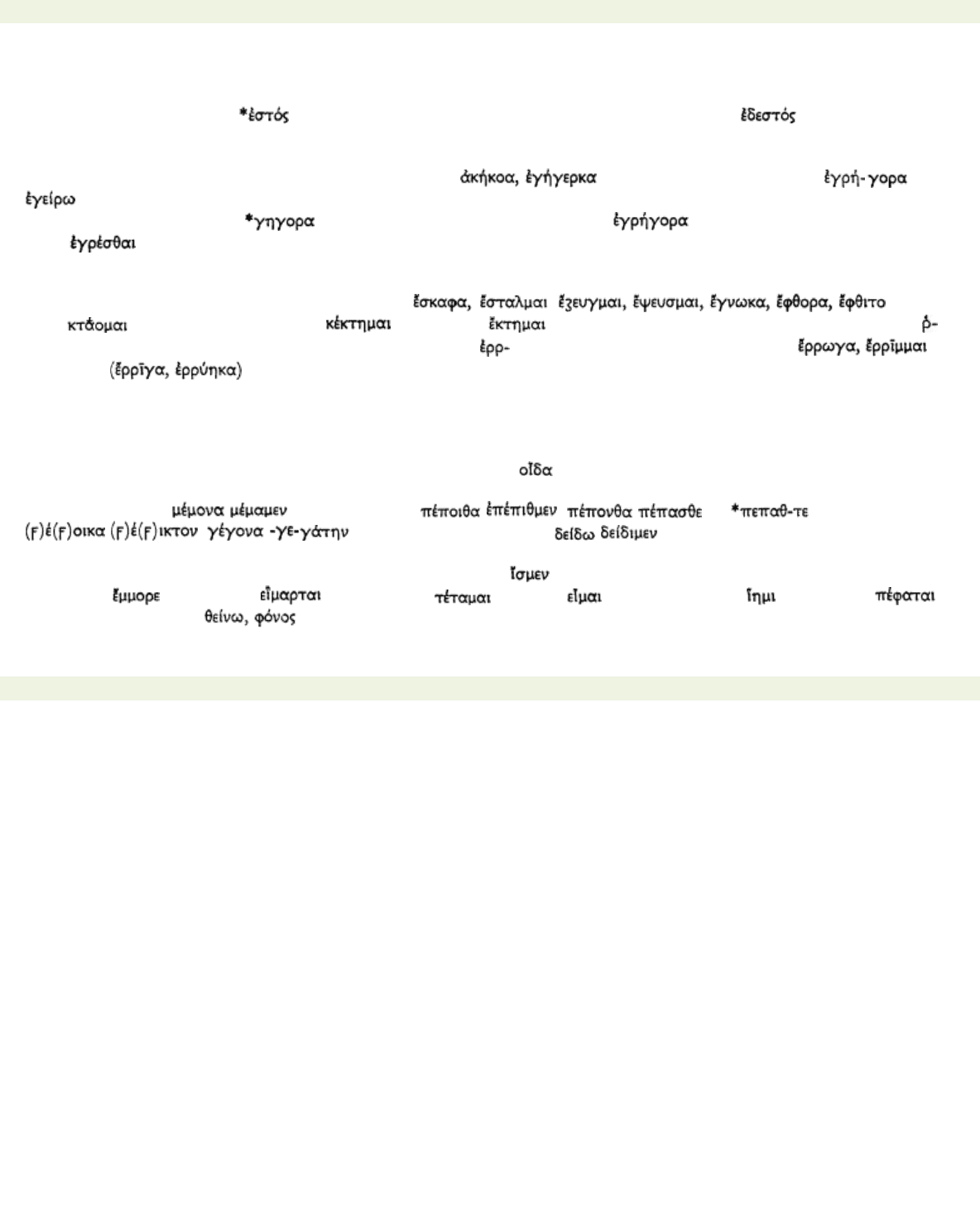
< previous page page_305 next page >
Page 305
out that, as a consequence of phonetic changes, certain forms of some verbs would have lost their connection with
the system, e.g. *ed-tós >
; reconnection was established by re-characterization to . However, this is
hardly satisfactory as a basis since the -to- verbal adjective is not characterized by reduplication. It would appear
then that Greek inherited from IE a form of intensive reduplication limited to roots of the above structure and that
this type was the model for further extension in Attic'
, etc. An anomalous form is from
. The root is *ger- with a prothetic vowel, so that a perfect *ge-gor-a might be expected, or (on the evidence
of Skt. jagara) *ge-gor-a: must then have been transformed to under the influence of the aorist
stem
.
Some roots beginning with two consonants other than plosive and liquid have the augment instead of reduplication.
This is particularly so if the first consonant is s: , . The
verb
shows both formations: (Attic) and (Homer and Ionic). In certain verbs the initial
disguises a cluster < *wr- or *sr- (pp. 227, 236), so that may represent either *we-wr- (e.g. )
or *se-sr-
.
The Perfect Stem
The Ablaut alternations within the perfect system were as follows: o in the active singular and zero in the active
plural and throughout the middle. In the Attic conjugation of
the e-grade appears in the subjunctive, optative,
the infinitive and the participle (on all these, see below). Within the finite verb Homer offers numerous examples
of the zero grade:
/ (*men-/mn *-), / , / (< < *pnth*),
/ , / . A concealed example is / (< *de-dwoi-a/ de-dwi-men, <
*dwei- 'fear'). Even at this early date, however, there are a good many perfects with o-grade throughout the active,
and in Attic the Ablaut alternation has been lost (except for
, etc.). In the middle the zero grade is better
preserved, (see above)/ (*se-sm-r*), (*te-tn* (*je-jH1-mai) to (*ji-je-mi),
(*gwhe*, *gwhn*, cf. , *gwhen*/gwhon*).
< previous page page_305 next page >
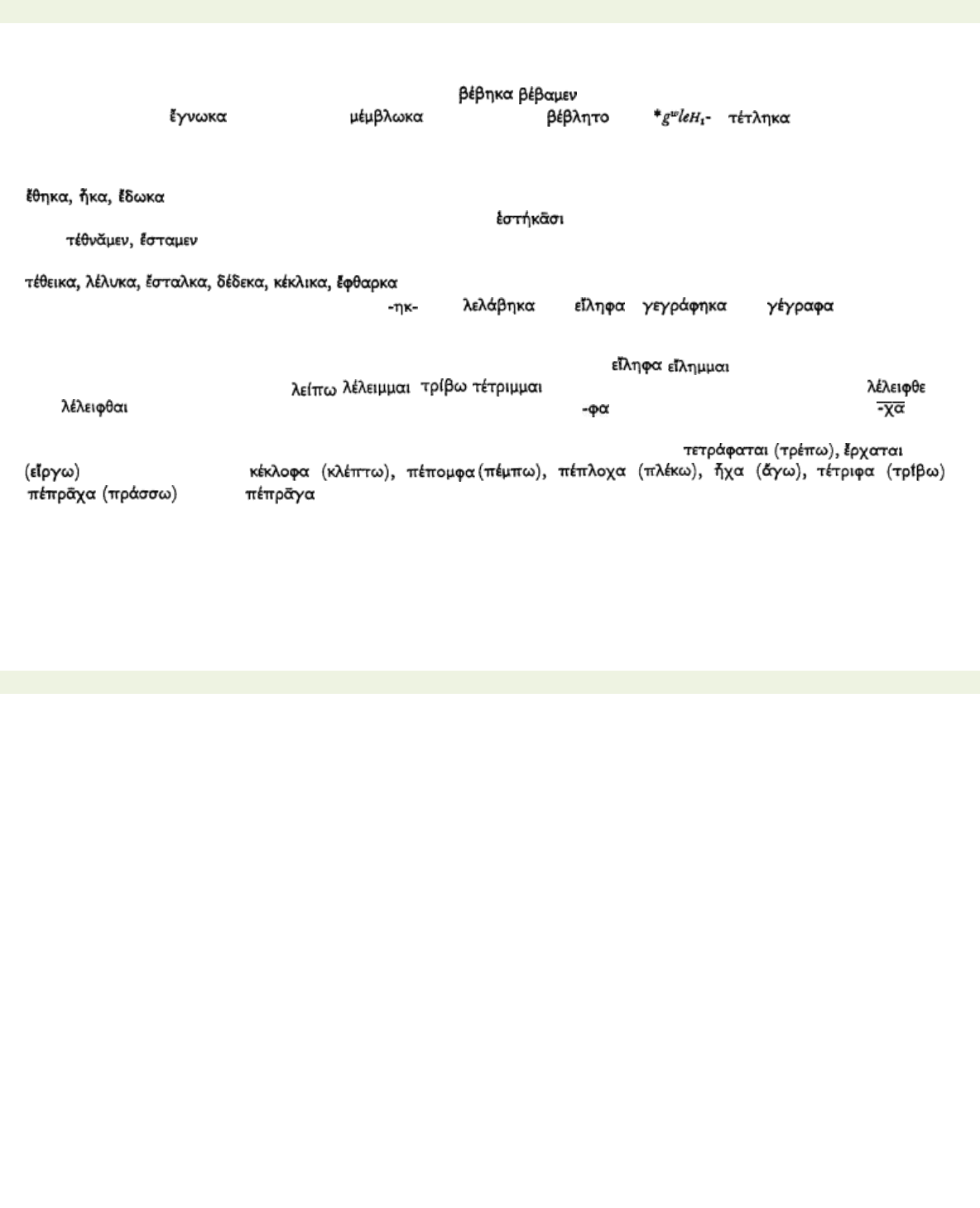
< previous page page_306 next page >
Page 306
Roots with nuclear vowel a show the alternation a/a:
/ . Roots with laryngeal suffixation have the II
form of the base: ( < *gneH3-), ( < *mleH3-), ( < * ), ( < *tleH2-), etc.
The difficulty of attaching inflexions with initial vowel (or consisting of a vowel like -a and -e-) to stems
terminating in a vowel was overcome by the insertion of a -k-, which is also observed in the singular of the aorists
. In Homer, too, this suffix appears predominantly in the singular of stems ending in a long vowel
or diphthong, with a few examples in the third plural (e.g.
). Attic, too, still has relics of this older system
(e.g.
), but after Homer -k-became the suffix par excellence of the perfect, the root being
increasingly in the zero grade, thus showing the influence of the middle:
, etc. In due course even stems ending in a plosive were brought into
the system by means of the composite suffix : e.g. (for ), (for ).
The last two examples, in which the root ends in an aspirated plosive, lead on to the aspirated perfect, which was a
development of Attic. In the middle, the plosive underwent assimilation: / , and this was also the case
with roots ending in -p- and -b-:
/ , / . The identical middle forms (especially
and ') were the switch-point for analogical active peffects in , and by a similar process also in .
These appear only in Attic and Ionic from the fifth century on, and they are invariably resultative in meaning. The
process started in the third plural middle, where the beginnings appear in Homer:
. Attic examples are:
(earlier ).
Pluperfect
Originally the perfect was an isolated formation with no accompanying preterite. In Greek it was brought into the
verbal conjugational system and provided with a past tense the pluperfect. It has the augment and secondary
endings. There is no difficulty about the terminations of the middle: they are identical with those discussed above.
< previous page page_306 next page >
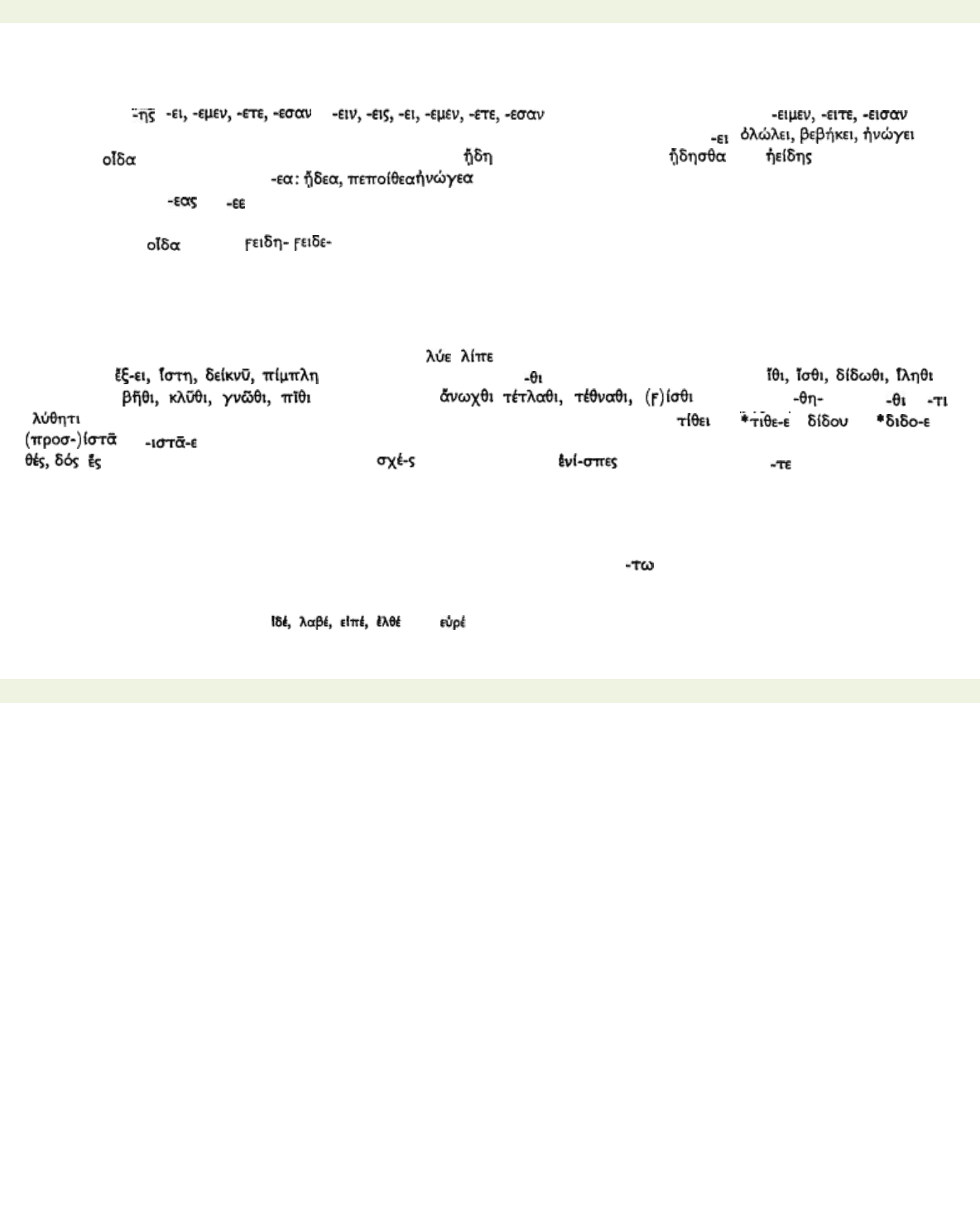
< previous page page_307 next page >
Page 307
In the active, three lines of development can be observed. In the most successful the endings go through two
stages: 1, -h,
, 2 the plural being levelled to in
post-Classical times). In Homer by far the most frequent form is the third singular in
( ,
etc.). For
the most frequent form is third singular with second singular and . On the other
hand the first singular ends in , and similar uncontracted endings are found in Ionic
(Herodotus) in 2,
. 3, : the facts are difficult to interpret. A simple description of Attic-Ionic is that in 1, 2, 3
and 6 the endings of the s-aorist are added to a stem with suffix -e. The origin of the suffix may be found in the
conjugation of
, where / is surely ancient.
IV The Moons
Imperative - Active
In 2, the bare stem appears in the thematic verbs: , 1 For the athematics there are several possibilities: 1, the
bare stem (
); 2, the locatival particle (p. 284) is added (presents ,
etc.; aorists (, etc.; perfects , , etc:; in the aorists >
( , etc.). Interaction with the thematic class may be the explanation of Attic (< ), (< ),
(< ). Unexplained is the origin of final -s which characterizes certain aorist imperatives of Attic (
, ) and also appears in the thematic and the Homeric (< *sqwe *). In 5, is added to the
stem, and the forms are identical with the unaugmented indicative with secondary endingsthe so-called injunctive.
Injunctive forms are also basic to 3 and 6. In Sanskrit a particle -u is added (bhávat-u), and similar forms appear in
Hittite estu, Skt. astu. Sanskrit presents also the ending -tat, which is used in 2, 3 and 5 in both active and middle.
This corresponds to the future imperative of Latin in -to(d) and the Greek
, which appears already in the
earliest texts. Despite
1 Attic aorist imperatives and preserve the original accentuation.
< previous page page_307 next page >
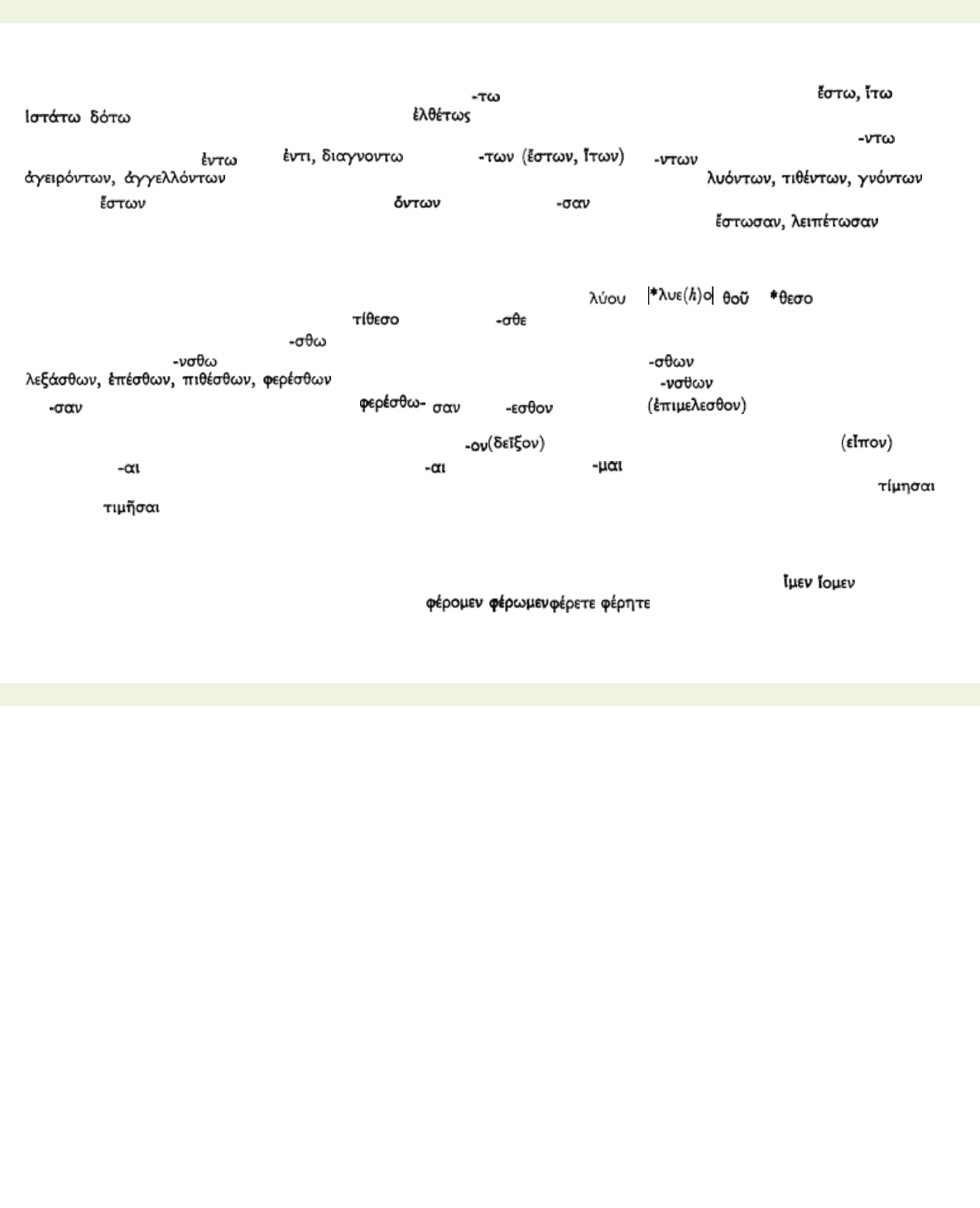
< previous page page_308 next page >
Page 308
the inherited indifference to person, number and voice,
became the mark of the third singular ( etc.,
, , etc.). From this a second singular (Cypr.) was coined by addition of the -s characteristic of
this person. For the third plural Greek evolved a number of solutions varying from dialect to dialect. 1,
(particularly in Doric after , etc.); 2, ; 3, (Hom.
, etc.), the formation which is the normal one in Attic-Ionic ,
etc.), but
is used in literature as against elsewhere; 4, , originating in the s-aorist, becomes
frequent in post-Classical times, though examples occur in Thucydides and Euripides
, etc.).
Imperative - Middle
In 2, the secondary ending *-so without augment (injunctive) is used ( < , < , but with
analogically restored or preserved -s- in
, etc.). In 5, is likewise an injunctive form, and this was the
basis for the analogically coined
for 3, which in some dialects is also used for 6. The following pluralizing
devices occur: (a)
sometimes with loss of -n-, in the Doric dialects; (b) is the only form in Homer
, etc.) and it is normal in Attic-Ionic; (c) is rare; (d) recharacterization
by
becomes common in later Greek ( - ); (e) in Lesbian .
In the sigmatic aorist the second active has the ending
, which appears in other aorists in -a . The
middle has
, which may be connected with the which appears in , etc. of the finite verb. The resemblance
to the aorist infinitive active is presumably coincidental (note the difference of accentuation in imperative
,
infinitive
.
Subjunctive
Two main types can be distinguished: 1, with athematic verbs a short thematic vowel is used ( / ); 2, with
thematic verbs the thematic vowel is lengthened ( / / ). Both types are IE: 1, Skt. ásti/ásati
(in Latin *es-o/es-et(i) survives as the future ero/erit); 2, Skt. bhdávani,
< previous page page_308 next page >
